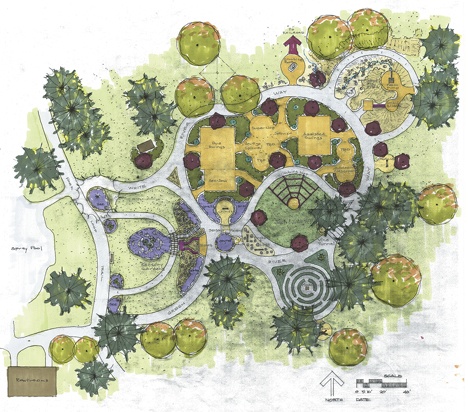While able-bodied kids scramble over or under, through or around playgrounds, their disabled peers can only watch from the sidelines and dream of playing on bars and whirling gizmos that weren’t designed for them.
It’s a sight that can break anybody’s heart.
Today the Auburn Parks, Arts and Recreation Department is ready to do something about this problem in the form of a new-fangled sort of playground in the old playground area at Les Gove Park east of the spraypark.
It’s called a “barrier-free playground,” a fancy term for a sniffable, touchable, ringable, swingable, slide-and roll-downable place packed with cool features that kids of all abilities can use together.
Features will include universally accessible surfacing and pathways, play structures designed to support all levels of development along with ramps, bridges and transfer stations that will allow every kid to reach the highest play deck. The park, all ground-based with platforms, will include elevated sand tables, interactive walls and auditory elements, as well as swings and bouncers with back support and sensory rich and tactile surfaces with activities that fire young imaginations.
“It’s going to be great,” said Daryl Faber, director of Auburn Parks, Arts and Recreation, which is in charge of the project.
The fun will start with an accessible path that leads to a transfer station where kids in wheelchairs can get off. At that point, there will be two parallel, 12-foot hill slides. Kids can either slide down these slides or take an ADA path to get into the bowl of activity.
By whatever means they get down there, the kids will find a lot to do when they arrive, like a sensory garden full of things for them to sniff like wintergreen or spearmint plants on a low wall or drums to beat and chimes to play or an abacus strung with stones that will teach them to count.
There also will be talking tubes, a climbing net, a vine tunnel, a climbing rock, a hill they can roll down in the old-timey way, a stream of water with operable gates, assisted swings and a digger that wheelchair-bound kids can manipulate from several feet above the sand.
Other features include:
• A group spinner – designed for child or a group, it features a large slanting ring that the children set in motion;
• Individual spinner – its slanting seat is set in motion by turning, spinning or balancing;
• Seesaw – adults sit with their child or two children sit together on this updated, safer version of the traditional seesaw;
• Sympathy swing – a special-needs child can sit on one swing seat and automatically swing by the movement and pumping of the child on the other seat. The top springs add multi-directional movement, back and forth and up and down.
While the rest of Auburn’s playgrounds meet required ADA-accessibility regulations, they don’t meet what Faber calls the “social requirement” of a playground.
“At our other playgrounds, there will always be the tall slide that kids can never get to. Here, everybody can do everything, and that’s one of our goals,” Faber said. “Many people think a disability is always just about wheelchairs, but that’s such a small number, about 1 percent. Disability is hearing impairment, its sight, it’s touch, it’s being in the sun too long, it’s so many different things. So through our design we’re trying to let everybody have a place to go.”
Julie Brewer, recreation special programs and marketing manager said the playground should be ready by May or June in time for the June 25 KidsDay, which will move from Game Farm to Les Gove Park.
Auburn City Councilwoman Lynn Norman and Faber were among the first to realize that building a barrier-free playground would be much better than just ripping out the old, tired playground south of the spray park and replacing it with, well, more of the same. So earlier this year the City formed a fundraising committee and a design committee. Auburn’s park planner, a landscape architect, has since finished the design, and the City has already bought some of the features.
Support is there
Meanwhile, the project’s task force has been effective in raising financial support. About $200,000 in corporate grants and donations have been raised for the $300,000 playground, according to Brewer.
The task force’s goal is to complete the fundraising efforts by spring.
“It will be a regional draw,” said Norman.
Donations can be made by corporations, businesses, foundations or individuals and are being accepted by the City of Auburn’s non-profit community partner, the Northwest Parks Foundation.
To make a gift to the campaign by credit card, please visit www.nwparks.org.
To make a donation by mail, please send a check to the Northwest Parks Foundation, c/o Auburn Imagine Play for All, P.O. Box 605, Woodinville, WA 98072-0605. Matching gifts also are encouraged.
No general fund money will be spent on the playground, although the City will use general fund money to restore a park restroom.
The original design called for the park to take up abut 10,000 square feet, but it has since expanded and spread out.
“What we’re doing is taking an existing low spot in the park and making it more active and removing an old playground that dates back to the 1960s and is not universally accessible,” said Faber. “We’re not taking out a ball field, and we’re not taking out walking paths. The half-mile loop will still exist …
“It will be a big draw, not only from Auburn but from all over, because there’s nothing like this. Spokane has a really nice barrier-free playground that just opened. It’s really popular, and the Head Start groups and the preschools are learning about it and are making it their own classroom. So there’s a lot of opportunity,” Faber said.
For additional details about the project, call the Parks, Arts and Rec Department at 253-931-3043 or the Northwest Parks Foundation at 425-284-0420.


